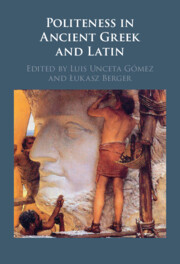Book contents
- Politeness in Ancient Greek and Latin
- Politeness in Ancient Greek and Latin
- Copyright page
- Contents
- Figures and Tables
- Contributors
- Preface
- Abbreviations
- Part I Introduction
- Part II The Expression of Im/Politeness
- Part III Im/Politeness in Use
- Chapter 6 Friendship Terms in Plato
- Chapter 7 Conversational Openings and Politeness in Menander
- Chapter 8 Im/Politeness of Interruptions in Roman Comedy
- Chapter 9 Im/Politeness and Conversation Analysis in Greek Tragedy
- Chapter 10 Qui Honoris Causa Nominatur
- Chapter 11 Banter, Teasing and Politeness in Varro’s De Re Rustica
- Part IV Ancient Perceptions on Im/Politeness
- Glossary
- References
- Index Rerum
- Index Locorum
Chapter 8 - Im/Politeness of Interruptions in Roman Comedy
from Part III - Im/Politeness in Use
Published online by Cambridge University Press: 08 September 2022
- Politeness in Ancient Greek and Latin
- Politeness in Ancient Greek and Latin
- Copyright page
- Contents
- Figures and Tables
- Contributors
- Preface
- Abbreviations
- Part I Introduction
- Part II The Expression of Im/Politeness
- Part III Im/Politeness in Use
- Chapter 6 Friendship Terms in Plato
- Chapter 7 Conversational Openings and Politeness in Menander
- Chapter 8 Im/Politeness of Interruptions in Roman Comedy
- Chapter 9 Im/Politeness and Conversation Analysis in Greek Tragedy
- Chapter 10 Qui Honoris Causa Nominatur
- Chapter 11 Banter, Teasing and Politeness in Varro’s De Re Rustica
- Part IV Ancient Perceptions on Im/Politeness
- Glossary
- References
- Index Rerum
- Index Locorum
Summary
The chapter uses the dialogues of Roman comedy (Plautus, Terence) to examine the correlation between the characters’ perception of im/politeness and the practice of interrupting. By adopting the methods of Conversation Analysis, the study sets out criteria to distinguish interruptions from other non-hostile or non-salient types of interventions in a dramatic text without explicit stage directions. According to the main argument, proper interruptions – just like impolite behaviour – are constructed interactionally and their identification depends on how the affected party reacts to someone invading their speaking turn. The analysis of face work in various types of turn-taking incidents, either collaborative or disruptive and antagonistic, helps to justify why given talk is not handled as an interruption. After comparing some qualitative and quantitative data, the chapter shows that there are many examples of face-threatening and hostile interventions in the comedy corpus that cannot be analysed as interruptions but rather should be associated with the type of interaction (e.g. conflictual talk) or the speaker’s dominant position within.
Keywords
- Type
- Chapter
- Information
- Politeness in Ancient Greek and Latin , pp. 202 - 226Publisher: Cambridge University PressPrint publication year: 2022

